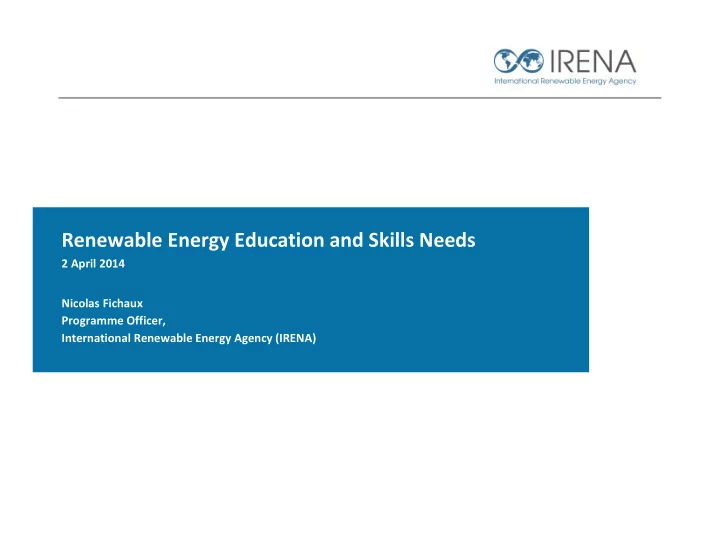

Renewable Energy Education and Skills Needs 2 April 2014 Nicolas Fichaux Programme Officer, International Renewable Energy Agency (IRENA)
2 IRENA Jobs report
Current Labour Gap
Renewable Energy Employment – skills gap • Given relatively high level of skills required, and urgent demand to fill occupations, the sector is often faced with a shortage of adequate skills to successfully complete projects. • Currently, most companies are recruiting experienced individuals with comparable skillsets and then providing job specific training. Occupations Identified as Difficult to Fill RE Sector Occupation Project developers; service technicians; data analysts; electrical, computer, mechanical and Wind Energy construction engineers. Solar Energy Photovoltaic and solar thermal system installers and maintainers; building inspectors. Electrical, and operations and maintenance engineers; technicians; tradespersons; Hydropower sustainability specialists. Trainers; geothermal engineers. Geothermal Bioenergy R&D and design engineers; service technicians; trainers. Source: IRENA Renewable Energy and Jobs 2013, based on International Labor Organization (ILO), 2011
Market reaction ‐ Education and Training by Sector Installed Capacity/Production Renewable Energy in 2012 60% Capacity Wind Power (GW) 283 Geothermal Power (GW) 11.2 50% Solar Power (GW) 357.5 Hydropower (GW) 990 Production 40% Ethanol (billion litres) 83.1 Biodiesel (billion litres) 22.5 30% 20% 10% 0% Bioenergy Geothermal Energy Hydropower Ocean Energy Solar Energy Wind Energy Source: IRENA Renewable Energy Learning Partnership, 2014
Geographic gap ‐ Education and Training in Geothermal Source: IRENA Renewable Energy Learning Partnership, 2014
Policy drive – ex. wind 7
Policy drive – 2012 US PTC 8
Promoting Skills Development through Policy • The policy and regulatory environment has a significant influence on the number of renewable energy jobs available and required supply of skills. Countries that experience sudden changes in • policy (either the enactment or removal of policy) typically experience either a shortage of adequate skills or an oversupply of labour. • Need for stable and long ‐ term renewable energy policy to support skills development and well planned education and training strategies. • Both quantitative and qualitative research is necessary to effectively project skills needs and target areas for training and skill development.
10 REMAP 2010 – 63 EJ
REMAP 2030 – 132 EJ 11 http://irena.org/remap/REmap%20Summary%20of%20findings_final_links.pdf
Renewable Energy Employment Doubling the share of renewable energy by 2030: 16.7 million jobs - Bioenergy: 9.7 million - Wind energy: 2.1 million - Solar PV: 2 million - Solar water heating:1.8 million - Small hydro: 0.6 million Source: International Renewable Energy Agency (IRENA), 2013 - Other RETs: 0.5 million Jobs report and REMAP 2030
STEM degrees as a percentage of all degrees (2011) 13
14 Share of STEM talent: Emerging and developed economies
Standardisation and Accreditation of Qualifications • Harmonised curricula and qualifications across countries can be helpful for reducing the time needed to react to market signals, easing company’s workforce selection, and facilitating mobility of students and workers. • Common quality standards make it possible to evaluate training programmes in an accreditation process against a set of defined requirements for competency, quality management, required resources and qualification.
Current Knowledge Gaps • Seeing a particular need not only for engineers and technicians, but also for specialized individuals within financial institutions who can adequately understand and review proposals for renewable energy developments. Source: NREL • There is also a large need for teachers and trainers in order to scale ‐ up of education and training.
Thank you
Recommend
More recommend